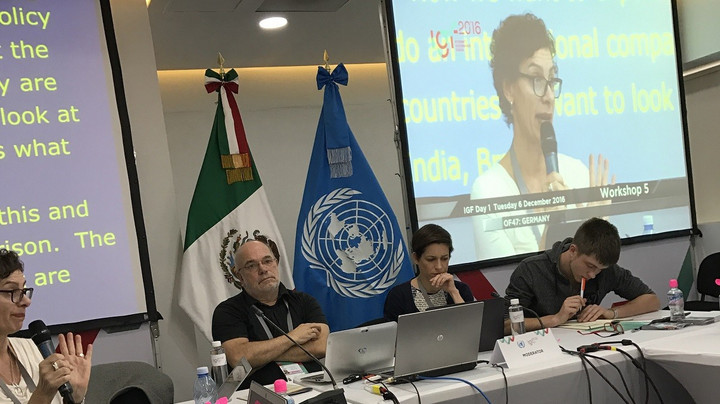Access, Human Rights, and Getting the Next Billion Online
Prof. Michael Rotert, eco Chairman of the Board, explains the workings of the Internet Governance Forum as a Global Multi-Stakeholder Platform

IGF 2016 Meeting in Guadalajara, Mexico - Session of the German Community, Credit: Michael Rotert
The UN’s Internet Governance Forum (IGF), a multi-stakeholder platform that facilitates the discussion of public policy issues pertaining to the Internet, usually focuses on access to the Internet as a human rights issue, rather than Internet usage. It is an issue not just for users and civil society, but also for those representing the Internet economy and the technical infrastructure behind the Internet. The IGF is a powerful platform for civil society, as it is a rare opportunity to share a forum for discussion and possible influence with technicians and government representatives.
To find out more about how the IGF functions as a multi-stakeholder platform, listen to this 11-minute interview with Prof. Michael Rotert or download it here to listen to it later:
One frequent topic of discussion is trans-border Internet, in particular “locked countries”, so when information in or information flowing through a country is modified, blocked, or otherwise obstructed in some way, sometimes with the support of a third party or another country. The discussions do not necessarily lead to policy changes, nor can a country be forced by the international community to stop blocking the Internet or electronic communication, but it does create a space to build public pressure on such countries, which in turn can give impetus and support to pressure groups and civil society in these countries.
Other bodies, such as the Council of Europe, do very valuable work on human rights for Internet users and they are really shaping the dialogue in the international arena. The IGF builds on such work and often brings in other perspectives and other voices. The Council of Europe’s work is often focused on legal issues, whereas the IGF is quite strong in addressing the technical aspects and the views of the civil society.
Free access to information and affordable access to the Internet are important human rights issues that the IGF addresses. Also discussed are cultural questions related to the Internet on a country level. These are usually discussed in special sessions organized by regions. There can be very heated debates on whether and how, for example, religion and churches should be present online.
Affordable Internet access is a huge issue for developing countries. While access may be technically available due to often very good mobile coverage, mobile Internet access is usually substantially more expensive. The IGF started an intersessional project “Policy Options for Connecting the Next Billion” in 2015, focused on developing a set of policy options aimed at the creation of enabling environments to help get the next billion Internet users online.
The IGF has changed the format of its forums to open up more to stakeholders who cannot attend the meetings. The discussions during the forum are live-streamed so interested individuals can follow the sessions in real-time online. In future, each session will have a rapporteur who will be responsible for summarizing the session proceedings and making these available online. Disseminating the discussions, debates and findings of the IGF is a priority.
Michael Rotert will be representing eco at the next IGF meeting in Geneva, Switzerland on 12-14 December 2017.
Find more information about the IGF on eco International.


